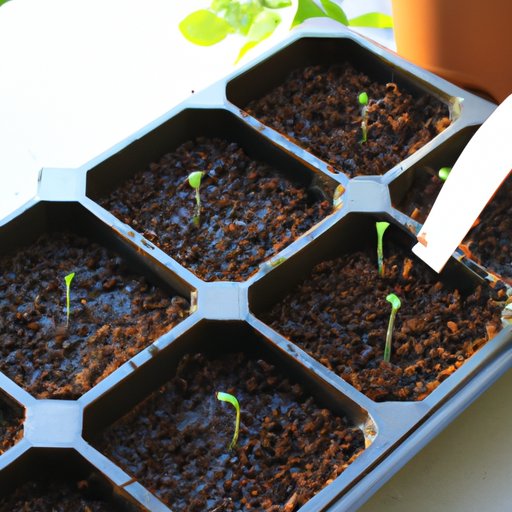Introduction
For many gardeners, starting plants from seed is an enjoyable and cost-effective way to add variety to their gardens. Growing plants from seed allows you to experiment with different varieties and colors, and it’s also a great way to get your children interested in gardening. While it may seem intimidating at first, starting plants from seed is actually a fairly straightforward process. With the right supplies and a little patience, you can watch your seeds take root and flourish.
Gather the Right Supplies
The first step in starting plants from seed is to gather the necessary supplies. You will need containers for your seedlings, potting soil or compost, fertilizer, and water. Containers can be anything from egg cartons to plastic cups, as long as they have drainage holes in the bottom. Make sure to use a sterile soil that is free of weeds and pests. Fertilizer will help give your seedlings the nutrients they need to grow. Finally, make sure you have access to a reliable source of water.
Choose the Right Seeds
Once you have your supplies gathered, it’s time to choose the right seeds. Before selecting your seeds, consider the climate and conditions of your area. Some plants require more sunlight or moisture than others, so it’s important to choose varieties that are well-suited to your environment. You should also decide what type of plants you want to grow. If you’re looking for vegetables, there are a variety of options including tomatoes, peppers, cucumbers, and squash. For flowers, you can choose from annuals, perennials, or biennials.
Prepare the Soil
Once you have chosen your seeds, it’s time to prepare the soil. You can purchase pre-made potting soil or create your own mix. To make your own mix, combine equal parts of sand, peat moss, and vermiculite. You can also add compost or fertilizer to provide additional nutrients to your seedlings. Make sure to mix the ingredients well before planting.
Plant the Seeds
Now it’s time to plant the seeds. Follow the instructions on the seed packet for the best results. Plant the seeds according to the recommended depth and spacing. It’s also important to label each container so you know what is planted where. This will make it easier to keep track of your plants as they grow.
Provide Adequate Water and Light
In order for your seedlings to thrive, they need adequate water and light. Monitor the water levels in your containers and make sure to keep the soil moist but not soggy. Most seedlings need at least six hours of direct sunlight per day, so make sure to provide an appropriate amount of light. If needed, you can supplement natural sunlight with a grow light.

Monitor Growth and Transplant as Needed
Once your seedlings have sprouted, it’s important to monitor their growth and make sure they have enough room to develop. Check for signs of overcrowding and re-pot if needed. You can also transplant your seedlings outdoors when the weather is warm enough. Make sure to harden off your seedlings before transplanting them outside.
Conclusion
Starting plants from seed is a fun and rewarding experience. With the right supplies, knowledge, and patience, you can watch your seeds take root and flourish. Gather your supplies, choose the right seeds, prepare the soil, plant the seeds, provide adequate water and light, and monitor growth and transplant as needed. With these simple steps, you can enjoy the fruits of your labor and reap the rewards of starting plants from seed.
(Note: Is this article not meeting your expectations? Do you have knowledge or insights to share? Unlock new opportunities and expand your reach by joining our authors team. Click Registration to join us and share your expertise with our readers.)
